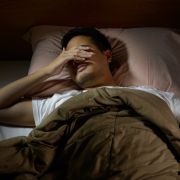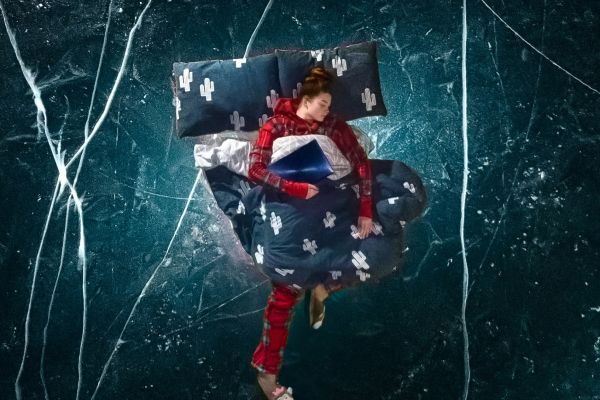Overcoming Insomnia
Everyone has trouble falling asleep from time to time; indeed, evidence suggests that 100 percent of adults experience periods of sleeplessness over the course of their lifetime. But a significant number of people struggle with insomnia, a common sleep disorder that can have severe deleterious effects on sufferers’ mental and physical well-being. Individuals with insomnia regularly struggle to fall asleep, stay asleep, or return to sleep upon waking prematurely. This can, in turn, trigger irritability, reduced cognitive abilities, anxiety, depression, and numerous physical health problems if left untreated.
On the bright side, many cases of insomnia, regardless of severity, respond well to treatment. Self-help strategies, like improving sleep hygiene or implementing at-home behavioral techniques, can help in most mild to moderate cases. For more severe or persistent cases, a specific kind of CBT aimed at treating insomnia has a strong success rate; medications are also available in certain cases. Though many people with insomnia suffer in silence, they may rest easier knowing that the disorder is common, easily diagnosable, and highly treatable.

There is no exact amount of sleep loss that defines insomnia, as everyone varies in the amount of sleep they need, their preferred sleep schedule, and how rested they feel after a typical night of good sleep. One core feature of insomnia, then, is that the sleep patterns associated with it differ enough from the individual’s ideal night of sleep that it causes them significant distress and negatively impacts their well-being.
Insomnia can occur at any age; it is even possible (albeit rare) for infants to have insomnia. Recurrent insomnia typically first onsets in adolescence or young adulthood, though it may begin later in life. Teens and young adults with insomnia tend to report greater difficulty falling asleep; older adults tend to struggle primarily with staying asleep. Either form of insomnia can cause sleep loss and psychological distress.
Symptoms of insomnia include difficulty falling asleep, difficulty staying asleep, and/or an inability to fall back asleep after waking up too early in the morning. Since many people experience these symptoms at least occasionally, in order to qualify for a diagnosis of persistent or chronic insomnia, they must persist for a period of 3 months and occur at least 3 times a week. (For more on the symptoms of insomnia, see our Diagnosis Dictionary.)
Persistent insomnia that goes untreated typically leads to sleep deprivation; chronic sleep loss, in turn, can come with serious ill effects, including an increased risk of heart disease, stroke, and many kinds of cancer; weight gain; accelerated skin aging and decreased bone density; reduced cognitive capacity; and more. Insomnia also comes with other dangers, like an increased risk of accidental injury or death. Thus, it’s imperative that anyone struggling with chronic insomnia take steps to address it as soon as possible.
Yes. According to the DSM, insomnia can be situational, persistent, and/or recurrent. Situational insomnia, as its name suggests, is triggered by a specific situation, such as a stressful life event or jet lag; it is sometimes called acute insomnia. Situational insomnia typically only lasts a few days or a few weeks. Persistent insomnia (often called chronic insomnia) is insomnia that occurs multiple times a week and lasts for months or years. Recurrent insomnia refers to periods of insomnia that stop and start periodically, typically lasting a few days or weeks with each recurrence. Insomnia is deemed “recurrent” if two or more episodes occur within a year.
Chronic insomnia is defined as persistent trouble falling asleep or staying asleep; these symptoms must occur more than three times a week over a period lasting at least three months.
Insomnia is among the most prevalent of all sleep disorders. The DSM reports that between 6 and 10 percent of the population meet the criteria for chronic insomnia, and many more suffer from periods of acute insomnia.
Though many people struggle with chronic insomnia for years, it is possible for the disorder to be managed and treated. Improving sleep hygiene, undergoing CBT-I, and (in some cases) using medications can all help bring chronic insomnia under control. Brief episodes of insomnia may still recur from time to time; if they are short-lived, they are likely nothing to worry about.
Insomnia itself is defined as a sleep disorder, rather than a psychiatric illness. However, insomnia is often a symptom of mental health disorders like anxiety, depression, or schizophrenia. Treating insomnia is thus often an important component of effective mental health treatment.
In general, the effect of insomnia on mental health is poor. Even one night of difficulty sleeping can trigger irritability, anxiety, or low mood; if these difficulties persist for weeks, months, or years, the negative effects of sleep deprivation can snowball and become even more severe. Treating the insomnia itself as well as the co-occurring mental health symptoms is often the most effective approach.
Chronic insomnia often occurs alongside clinical depression; some experts even suggest that insomnia should be considered a core symptom of the disorder. But the question of whether one causes the other, or whether the effect is bidirectional, with insomnia worsening depression and vice versa, continues to be explored by researchers.
Most cases of sleep deprivation, even chronic insomnia, will not trigger psychotic symptoms. But in cases of severe sleep deprivation—in which an individual gets little to no sleep over a period of several days or more—it is possible for someone to experience visual or auditory hallucinations, extreme feelings of paranoia, and other features of psychosis. Sleep deprivation is also common among those with schizophrenia, and is thought to be related to the onset or recurrence of the disorder.

Though it’s not always known exactly what is causing someone’s insomnia, there are many potential culprits that should be explored. Many cases of acute insomnia are triggered by co-occurring life events that may be causing stress, excitement, or otherwise making sleep challenging; there may also be physical causes, such as a new medication or a painful injury. Long-term cases of insomnia may be related to a co-occurring mental health disorder, a disturbance in the sleep-wake cycle, or a chronic medical condition that interferes with sleep. Identifying the specific cause of insomnia is often useful for managing and treating the disorder.
Insomnia can be caused by many factors. These include anxiety, stress, jet lag, grief, medication side effects, depression, chronic pain, alcohol consumption, caffeine use, and more. (For more on the causes of insomnia, see our Diagnosis Dictionary.)
Yes, menopause is a known trigger for sleep problems in general; insomnia itself tends to increase significantly during perimenopause and may continue post-menopause. According to the CDC, almost one-quarter of perimenopausal women report frequent trouble falling asleep, while more than 30 percent struggle to stay asleep most nights. After menopause is complete, more than 25 percent of women report continuing trouble falling asleep; more than half report frequently waking up tired.
Short-term periods of stress, like dealing with a challenging problem at work, can trigger situational insomnia that lasts for a few days or weeks. Environmental changes—such as new neighbors moving in or a sudden spike in temperature—can similarly trigger short-term bouts of sleeplessness. Jet lag or other sleep-wake disturbances can throw off someone’s circadian rhythm and lead to a brief period of insomnia. In most cases, these situational triggers will resolve on their own.
Yes; stress has been found to be one of the most common causes of insomnia, particularly situational or acute insomnia. Anxiety about not sleeping can also worsen insomnia, creating a cycle of stress and sleeplessness. Managing one’s stress—whether through formal therapy or through self-help techniques—will likely help an individual reduce their likelihood of experiencing insomnia.
Yes. Traumatic events can trigger significant stress, feelings of hypervigilance, and persistent anxiety, any of which can negatively impact one’s ability to fall asleep or stay asleep. Depression or rumination caused by the trauma may also contribute to persistent sleep difficulties; in some cases, victims of trauma may (consciously or unconsciously) fear falling asleep due to the belief that it leaves them vulnerable to being harmed again. Since sleep deprivation can worsen the after-effects of trauma, it’s critical to ask about and address insomnia as part of a comprehensive post-trauma treatment plan.
Insomnia is a frustrating disorder to live with, and the emotional distress it causes tends to worsen over time. Many people, especially those whose insomnia comes and goes, don’t seek formal treatment for it. But chronic insomnia isn’t something that must be tolerated or endured. There are several empirically-supported treatment options for insomnia—including some that can be completed over a short period of time. The front-line treatment for insomnia, CBT-I, has proven to be highly effective in many cases and typically only requires a few months of committment. Self-help strategies, though they require dedication and effort to maintain, can also produce significant results for many sufferers—and may even improve other aspects of physical and mental health along the way.
The American Academy of Sleep Medicine recommends cognitive behavioral therapy for insomnia, or CBT-I, as the first-line treatment for chronic insomnia. CBT-I aims to change the behaviors and negative thought patterns that contribute to persistent sleeplessness. Other treatments include medications—though most should be used only over the short term—melatonin supplements, or light therapy. (For more on treating insomnia, see our Diagnosis Dictionary.)
If one is experiencing poor sleep, dedicating at least two weeks to improving their sleep hygiene may solve the problem. If not, and if one continues to experience steady sleep disruption or insomnia, it may be time to consult a doctor, who may be able to provide a referral to an expert in sleep medicine.
It could help. A specific type of therapy known as CBT-I has been shown to be effective at targeting insomnia symptoms directly. Traditional psychotherapy or other forms of CBT may also be useful, particularly for those who have a co-occurring mental health disorder like anxiety or depression; targeting the symptoms of that disorder will likely help improve sleep at least somewhat, as well as improve well-being overall.
Yes. Cognitive behavioral therapy that is specifically targeted at insomnia (known as CBT-I) has been found in research to be generally more effective than medication, with effects that persist long after treatment has ended. CBT-I targets the anxious thoughts associated with going to bed, as well as the counterproductive behaviors—like sleeping in on the weekends or doing work in bed—that get in the way of restful sleep. A round of CBT-I usually lasts a few weeks to a few months.
Medication can be useful for short-term bouts of insomnia, or periods of sleeplessness caused by jet lag or other sleep-wake disturbances. However, long-term use of these medications can be dangerous or habit-forming; thus, most experts recommend behavioral treatments for chronic insomnia whenever possible.
There are several pharmacological options available to treat severe insomnia. These include benzodiazepines (such as Ativan, Klonopin, or Temazepam), non-benzodiazepines (such as Ambien, Sonata, or Lunesta), clonidine, certain antidepressants, and more. All have been shown to be effective in certain situations, but may come with side effects or a risk of dependence. In most cases, medications are only recommended for short-term use; a doctor may prescribe them for longer periods depending on a patient’s specific circumstances.
Yes; research has consistently found that regular exercise greatly improves sleep quality. However, some experts caution that the effects of exercise may not show up immediately; rather, it’s critical to maintain an exercise habit for weeks or months in order to see measurable effects on chronic insomnia.
Eating certain foods before bedtime—like turkey, tomatoes, and whole grains—is theorized to stimulate the production of the hormones, neurotransmitters, and amino acids that induce sleep, like melatonin or tryptophan. Avoiding foods that promote wakefulness—like spicy foods or those containing caffeine—may be just as critical.














